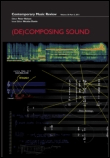
Contemporary Music Review
Scope & Guideline
Shaping the Future of Contemporary Sound
Introduction
Aims and Scopes
- Exploration of New Compositions and Techniques:
The journal emphasizes the analysis and discussion of contemporary compositions, including new methods of composing, particularly in non-Western contexts such as Indonesian music. This reflects a commitment to understanding how cultural specificities influence musical practices. - Interdisciplinary Approaches to Music:
Contemporary Music Review often intersects music with other disciplines such as visual arts, performance studies, and cultural theory. This interdisciplinary focus allows for a richer understanding of music's role in various societal and artistic frameworks. - Focus on Performance and Listening Practices:
The journal examines diverse performance practices and listening experiences, investigating how these aspects contribute to the interpretation and understanding of contemporary music, including issues of embodiment and the politics of listening. - Cultural and Historical Contextualization:
There is a consistent focus on situating contemporary music within broader historical and cultural narratives, including the influences of globalization, identity politics, and technological advancements on music creation and reception. - Engagement with Social Issues:
The journal includes research that addresses social and political issues through the lens of music, exploring themes such as feminism, race, and community engagement within contemporary musical practices.
Trending and Emerging
- Intersections of Music and Technology:
Recent publications increasingly explore the impact of technology on music creation and performance, including the use of electronic instruments, software, and digital platforms. This trend is crucial as it reflects the ongoing evolution of music in a digital age. - Global Perspectives on Music:
There is a growing interest in music from diverse cultural backgrounds, particularly from non-Western contexts. This includes a focus on Indonesian music and the dynamics of local music scenes, indicating a shift towards a more globalized understanding of contemporary music. - Social and Political Engagement through Music:
Emerging themes related to social justice, identity politics, and community engagement are increasingly prominent. This trend highlights the role of music as a medium for activism and cultural expression in response to global challenges. - Exploration of New Performance Practices:
The journal is seeing a rise in discussions surrounding innovative performance practices, including improvisation and site-specific performances. These practices challenge traditional notions of concert settings and audience interactions. - Feminist and Gender Studies in Music:
There is an increasing body of work addressing gender dynamics in music, particularly through feminist lenses. This trend is significant as it explores representation and the role of women in contemporary music composition and performance.
Declining or Waning
- Traditional Western Classical Music:
Research focusing on traditional Western classical music compositions and practices has become less frequent, suggesting a shift towards more avant-garde and diverse musical forms that reflect contemporary realities. - Purely Historical Music Analysis:
There is a noticeable decrease in papers dedicated solely to historical analysis without contemporary relevance. This indicates a preference for studies that connect historical practices to current musical trends and social issues. - Conventional Music Theory:
Conventional approaches to music theory, particularly those that do not engage with contemporary practices or innovations, seem to be declining. This reflects a broader trend towards more flexible, inclusive, and applied theoretical frameworks.
Similar Journals
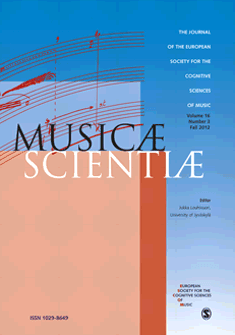
MUSICAE SCIENTIAE
Advancing Understanding of Music's Cognitive ImpactMUSICAE SCIENTIAE, published by SAGE Publications Ltd, is a prestigious interdisciplinary journal situated at the intersection of music and psychological studies. Established in 1997, this journal has garnered an impressive reputation, as evidenced by its 2023 Scopus rankings, where it ranks #2 in Music (Arts and Humanities) and #51 in Experimental and Cognitive Psychology. With a considerable impact factor and categorized in the Q1 and Q2 quartiles, it stands as a key resource for researchers, students, and professionals interested in the cognitive processes related to music engagement and its applications. Although it does not operate under an open access model, MUSICAE SCIENTIAE provides valuable insights and empirical studies that contribute to the ever-evolving understanding of music's impact on human behavior and cognition. By fostering a robust platform for scholarly dialogue, this journal continues to significantly influence research and practice within its fields.
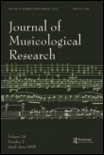
JOURNAL OF MUSICOLOGICAL RESEARCH
Contributing to the Evolution of Musicological DiscourseJOURNAL OF MUSICOLOGICAL RESEARCH, published by Taylor & Francis Ltd, is an esteemed platform that delves into the field of musicology, contributing to the ongoing dialogue in music research and scholarship since its establishment in 1979. With an ISSN of 0141-1896 and an E-ISSN of 1547-7304, this journal serves as a vital resource for researchers, professionals, and students, offering insights into diverse musicological topics. Although currently categorized in Q4 in Music with Scopus rankings placing it at #110 out of 180 in the Arts and Humanities field, its commitment to excellence and broader discourses in music studies is evident. The journal does not have Open Access options, yet it provides accessible content through reputable academic channels, fostering scholarly exchanges within the community. It aims to publish high-quality research that advances understanding of musical practices and cultural implications, making it a critical resource for those passionate about music and its myriad influences.

REVUE DE MUSICOLOGIE
Delving Deep into Music's Theoretical DimensionsREVUE DE MUSICOLOGIE is a prominent academic journal dedicated to the diverse field of musicology, published by EDITIONS TRANSATLANTIQUES in France. With an ISSN of 0035-1601, this journal has been a key platform for researchers and scholars since its inception, fostering scholarly discourse and advancing the understanding of music's cultural, theoretical, and historical dimensions. Although it currently holds a Q4 category in Music according to the 2023 quartiles and is ranked #140 in the Scopus Arts and Humanities Music category, REVUE DE MUSICOLOGIE continues to publish valuable insights that contribute to the global musicological landscape. The journal does not offer open access, adhering to standard subscription models. Its primary objective is to provide a rigorous forum for original research articles, reviews, and theoretical discussions, making it an essential resource for academics, professionals, and students in the field of musicology. Located at 50 RUE JOSEPH DE MAISTRE, 75018 PARIS, FRANCE, it promises to remain a vital part of music research through 2023 and beyond.

Muzikoloski Zbornik
Celebrating Diverse Voices in MusicologyMuzikoloski Zbornik is a prominent open-access journal in the field of musicology, published by the esteemed University of Ljubljana Press since 1965. Hailing from Slovenia, this journal has been dedicated to advancing the study of musical heritage, theory, and practice, serving as a vital platform for researchers, professionals, and students alike. With a notable Q2 category ranking in the field of music and a Scopus ranking of 109 out of 180 in Arts and Humanities, Muzikoloski Zbornik showcases high-quality research, fostering discourse and collaboration among scholars globally. The journal embraces a diverse range of topics, from ethnomusicology to music education, ensuring its relevance in an ever-evolving academic landscape. By providing unrestricted access to its content, it champions the dissemination of knowledge and supports the growth of the musicology discipline.
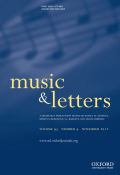
MUSIC & LETTERS
Unveiling the Rich Tapestry of Musical NarrativesMUSIC & LETTERS, published by Oxford University Press, is a prominent academic journal that has been at the forefront of musicology and music studies since its inception in 1920. With an ISSN of 0027-4224 and an E-ISSN of 1477-4631, the journal provides a platform for scholarly articles that explore the rich interplay between music and literature, contributing significantly to the understanding of musical context, form, and societal impact. As of 2023, it holds a respectable Q3 rank in Music within its category, positioned at Rank #66 out of 180 in the Scopus Arts and Humanities Music category. Despite not being an Open Access journal, its rigorous peer-review process and commitment to high-quality research make it an essential resource for researchers, professionals, and students alike. The journal's scope encompasses various genres and historical periods, ensuring a comprehensive examination of music's role in culture and community, thereby enhancing the scholarly discourse within this vibrant field. Based in the United Kingdom, at Great Clarendon St, Oxford OX2 6DP, England, MUSIC & LETTERS continues to inspire and inform the global music scholarly community.
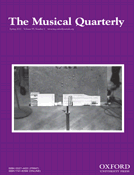
MUSICAL QUARTERLY
Advancing Musicology Through Critical DiscourseMUSICAL QUARTERLY, published by Oxford University Press Inc, is a distinguished journal in the field of music, with a publication history that stretches back to 1915. This esteemed journal, identifiable by its ISSN 0027-4631 and E-ISSN 1741-8399, provides a critical platform for scholarly discourse, analysis, and research in musicology and related disciplines, facilitating an understanding of both historical and contemporary musical practices. Although it operates without open access, it continues to attract a diverse readership of researchers, educators, and students alike, thanks to its well-curated articles and reviews that engage with music theory, history, and ethnomusicology. With a current Scopus rank of #119 out of 180 in the Arts and Humanities category and a 34th percentile ranking in Music, MUSICAL QUARTERLY plays a vital role in advancing knowledge and fostering collaboration within the music academic community. Its commitment to high-quality scholarship is reflected in its ongoing efforts to address the evolving landscape of music studies, making it an essential resource for anyone serious about exploring the rich tapestry of music scholarship.

Oido Pensante
Bridging Theory and Practice in Music ResearchOido Pensante is a prominent open-access journal dedicated to the multifaceted field of music, published by the esteemed University of Buenos Aires, specifically through its Faculty of Philosophy and Letters, Institute of Anthropological Sciences. Since its inception in 2013, this journal has fostered a rich platform for scholarly discourse and innovative research at the intersection of music and cultural studies. With an ISSN of 2250-7116, Oido Pensante aims to bridge theoretical frameworks and practical applications, making significant contributions to the understanding of music in its social context. Currently, it holds an impressive Q3 ranking in the Arts and Humanities – Music category for 2023, with a Scopus rank of #99 out of 180 journals, reflecting its commitment to academic rigor and relevance. The journal's open access policy ensures that research is widely disseminated and accessible, making it an invaluable resource for researchers, professionals, and students alike in Argentina and beyond. With converged years from 2017 to 2024, Oido Pensante continues to expand its reach, encouraging intellectual exchange and stimulating dialogue within the music community.
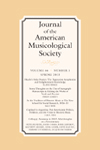
JOURNAL OF THE AMERICAN MUSICOLOGICAL SOCIETY
Pioneering insights in the art of music.JOURNAL OF THE AMERICAN MUSICOLOGICAL SOCIETY, published by University of California Press, is a prestigious peer-reviewed journal dedicated to advancing the field of musicology. With an ISSN of 0003-0139 and E-ISSN 1547-3848, this journal has been a cornerstone of scholarly communication since its inception in 1970 and continues to be relevant through 2024. Its esteemed standing is reflected in its Q2 ranking in the Music category and a respectable 71/180 ranking in the Arts and Humanities discipline, placing it in the 60th percentile among its peers. The journal provides an essential platform for researchers, professionals, and students to explore diverse topics in musicology, ranging from historical studies to contemporary analyses. While it does not currently offer Open Access options, its rigorous editorial standards ensure the publication of high-quality research that contributes significantly to the academic dialogue in music studies. With its address based in the United States at 155 Grand Ave, Suite 400, Oakland, CA 94612-3758, the journal remains a vital resource for those seeking to deepen their understanding of the complexities of music and its societal impacts.
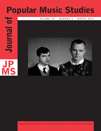
Journal of Popular Music Studies
Illuminating the Intersection of Music and SocietyJournal of Popular Music Studies, published by University of California Press, is a preeminent academic journal dedicated to the exploration and analysis of popular music and its cultural implications. With an ISSN of 1524-2226 and an E-ISSN of 1533-1598, this journal encompasses a range of methodologies, encouraging interdisciplinary dialogue across fields such as musicology, cultural studies, and sociology. Since its inception in 1988, it has provided a platform for critical examination of popular music through various lenses, contributing significantly to the understanding of music in contemporary society. The journal maintains a robust reputation, currently holding a Q2 ranking in the Music category of Scopus, positioning itself within the 58th percentile among its peers. As an invaluable resource for researchers, professionals, and students alike, the Journal of Popular Music Studies remains committed to fostering innovative scholarship and discussions that illuminate the impact of popular music on social and cultural landscapes.
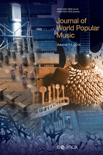
Journal of World Popular Music
Connecting Genres, Cultures, and Communities Through MusicJournal of World Popular Music, published by EQUINOX PUBLISHING LTD, serves as a pivotal platform for scholars and practitioners within the evolving field of popular music studies. With an ISSN of 2052-4900, this esteemed journal has notably positioned itself within the Q2 category of Music as of 2023 and ranks at #90 out of 180 in the Arts and Humanities sector according to Scopus metrics. Spanning research from 2014 to 2023, the journal invites contributions that span diverse musical genres, cultural studies, and global perspectives, ultimately enriching the discourse surrounding the sociocultural impact of popular music. While not open access, the journal offers a robust platform for interdisciplinary research, making it indispensable for researchers, educators, and students keen on exploring the dynamics of popular music and its role in contemporary societies.